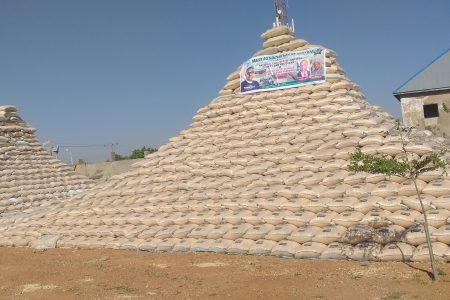Maize farmers begin loan repayment, kick-off dry season cultivation
Maize farmers across the country have begun the aggregation of maize under the Anchor Borrower Programme (ABP) of the federal government. Already in Funtua, Katsina State, farmers last week brought over 33,000 bags (100kg), showcased in pyramids, for a ceremony along Sokoto road, but which had to be postponed due to the abduction of the […]

A pyramid of maize aggregated in Funtua
Maize farmers across the country have begun the aggregation of maize under the Anchor Borrower Programme (ABP) of the federal government.
Already in Funtua, Katsina State, farmers last week brought over 33,000 bags (100kg), showcased in pyramids, for a ceremony along Sokoto road, but which had to be postponed due to the abduction of the Kankara schoolboys in the state.
Speaking to Daily Trust in Funtua, president of the Maize Association of Nigeria (MAAN), Dr Abubakar Bello Funtua, said the association was at the aggravation level where farmers brought their produce as part of their loan recovery.
“For the dry season cultivation this year, CBN will support us because we want to bridge the gap created by what happened in the first six months because of COVID-19 and flooding.
“CBN is going to finance about 750,000 with some other commodity associations. Definitely, this year 2020/ 2021 season will be a very good year for maize production in Nigeria,” he said.
The MAAN president said the association is targeting about 22 states to commence the 2020/2021 dry season farming with a target of cultivating 400,000 hectares. It hopes to get as many farmers as possible to join the scheme to address the wet season shortfall.
When Daily Trust asked Dr Abubakar if that would stop importation, he said: “Yes of course, that is why I emphasised that a lot of maize was produced this year and in the dry season, we will get more maize in this country. So there’s no need for any importation of maize because whatever they (processors) may need to meet their demand, they will get it here from our local production.
“We’re also calling on the processors to come and join us. Let’s go to the farms together so that they too can produce whatever they want. And now we are using Aflasafe, which controls the Aflatoxin contamination that people are complaining about; that problem has already been solved. So there’s no need for the importation of maize into this country.”
The association said it currently has about 15 off-takers for this wet season who are maize processors and millers with more coming in next season.
The Deputy Director, Development Finance Department of the Central Bank of Nigeria (CBN), Mr Elenwor Ihua, said the bank’s financing model is to ensure that it did not give cash but provided inputs.
Speaking on importation, the CBN deputy director said Nigeria has the landmass, capacity and workforce to produce enough maize that could feed the country but noted that the problem was that the country produced maize in only one season.
“What has been happening is because we cultivate maize in only one season; there’s a season where you are going to harvest and there’s another season when there will be no harvest so there will be scarcity of maize.
“However, with this initiative that we are doing with the likes of MAAN and other organisations, we intend to have at least two circles of production. We have already started preparing for the dry season by the end of December. In January we will have 750,000 hectares, that is going to be a huge boost to the market and at the end of the day, there would not be any need to import maize into the country,” Mr Ihua said.
